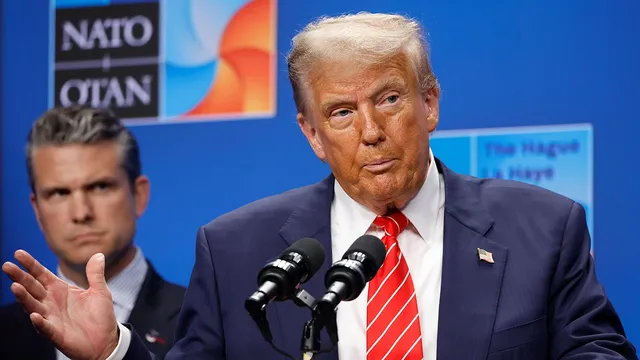
NATO leader calls Trump 'daddy' amid controversy
2025-06-28 06:00- Mark Rutte likened Donald Trump to a father figure during a press conference at the NATO summit.
- Rutte defended Trump’s foul language regarding Israel and Iran's conflicts as a necessary diplomatic tactic.
- The incident has sparked discussions about the dynamics of NATO leadership and American influence.
Express your sentiment!
Insights
At the NATO summit held in The Hague on June 25, 2025, NATO Secretary-General Mark Rutte referred to U.S. President Donald Trump as 'daddy' while addressing an awkward yet humorous exchange about the Israel-Iran conflict. Rutte made this statement during a press conference, drawing analogies between Trump’s role in global diplomacy and that of a father dealing with quarrelsome children. He noted the U.S. President's use of strong language while criticizing both countries, claiming they 'don’t know what the f*** they’re doing.' Rutte justified Trump's expletive outburst as necessary for managing international relations effectively and suggested that strong language sometimes serves to diffuse tensions. This incident followed Trump's assertions on June 24, when he expressed frustration towards Israel and Iran's failure to adhere to a ceasefire agreement he had previously negotiated, which added to the complexity of the ongoing international discussions. Rutte’s comments stirred laughter from those present, including Secretary of State Marco Rubio, who found humor in the NATO chief's remarks. In a display of camaraderie, Trump later responded positively to Rutte's comment, indicating he perceived it as a sign of affection rather than a lack of respect towards NATO allies. Rutte had spent significant time before the summit praising Trump for his efforts to increase NATO member defense spending and for persuading allies to commit to higher defense budgets, particularly as pressure has mounted on them to meet their obligations. He voiced his belief that without Trump, the situation regarding NATO priorities wouldn’t have advanced as it has. Trump's previous criticism of NATO members for their reliance on U.S. defense support has continuously shaped the dynamics of these international alliances, leading to recent commitments to allocate five percent of their GDP towards defense. Despite some criticism over Rutte's complimentary remarks aimed at Trump, he defended his affection for the U.S. president while emphasizing the importance of strong U.S. leadership in global affairs, particularly concerning international security challenges. His remarks highlighted the evolving relationship between Trump and NATO allies, illustrating how the dynamics of international diplomacy continue to shift based on strong personalities and public statements. Rutte's 'daddy' comment has sparked discussions about the perception of power dynamics within NATO and may significantly impact how leaders communicate in future diplomatic engagements.
Contexts
NATO, or the North Atlantic Treaty Organization, was established in 1949 primarily for collective defense against potential aggression, and since its inception, one of its key components has been the commitment of member nations to spend a certain percentage of their Gross Domestic Product (GDP) on defense. The current guideline, established in 2014 during the Wales Summit, calls for NATO members to aim for a defense spending target of at least 2% of their GDP by 2024. This commitment was underscored by the changing global security environment, particularly in response to increased military activity from Russia and other threats. Prior to this summit, spending commitments varied significantly among member states, leading to concerns about burden-sharing and the overall effectiveness of NATO's collective defense capability. Historically, NATO spending commitments have evolved through various summits and agreements. The Cold War era saw significant military expenditures as member countries focused on deterrence against the Soviet Union; however, after the Cold War, many nations reduced their defense budgets, concentrating on peacekeeping and other security initiatives rather than traditional military preparedness. As a result, by the early 2000s, a number of member states were struggling to meet even the previous aspiration of spending 2%, which had been an informal guideline rather than a formal benchmark. This disparity raised questions about the alliance's readiness and collective security framework. In 2016, NATO leaders reaffirmed their commitment to increasing defense spending, acknowledging that the previous levels were insufficient given the evolving global threats. Since the Wales Summit, many NATO members have made significant strides in increasing their defense budgets. By 2020, a number of countries, including Poland, the Baltic states, and Romania, achieved the 2% target, demonstrating a commitment to modernizing their armed forces and contributing to collective security. The United States has consistently urged its allies to honor their financial commitments to share the defense burden more equitably. While some nations have improved their spending, challenges remain, as several members still fall short of the target, causing ongoing debates about collective security and individual responsibilities. As of mid-2025, NATO spending commitments continue to be critical in shaping the alliance's response to global security challenges. The rise of China as a strategic competitor, ongoing conflicts in Eastern Europe, and persistent terrorism all no longer render traditional approaches sufficient. As such, there is a growing emphasis on not just meeting spending benchmarks but also ensuring that reforms to military capabilities and readiness are scaled to match these financial commitments. The member nations recognize that substantial investment in defense is not simply a financial obligation but a necessity for maintaining peace and security within the Euro-Atlantic area. Ultimately, the future of NATO will depend on its collective ability to adapt to new security challenges while maintaining unity in defense spending commitments.